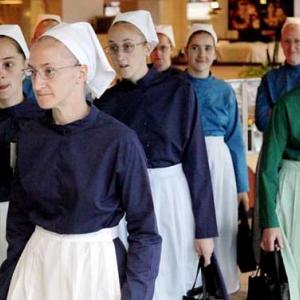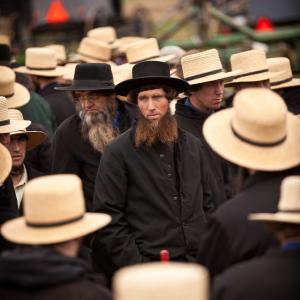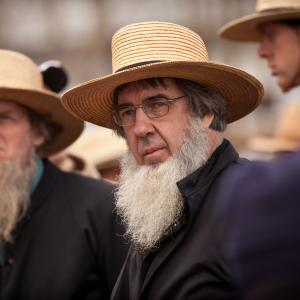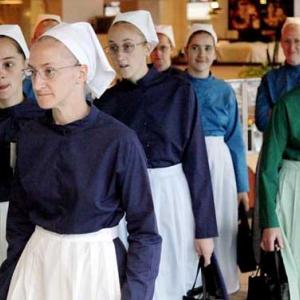Posts By This Author
16 Amish Found Guilty of Hate Crimes in Beard-Cutting Attacks
Amish bishop Samuel Mullet was convicted Sept. 20 of federal hate crimes and conspiracy for exhorting followers to forcibly shear the hair and beards of those who opposed his breakaway Ohio sect.
Mullet’s three sons, his daughter, and 11 other family members and followers from his ultra-strict Amish order 100 miles southeast of Cleveland also were convicted of conspiracy and hate crimes after a trial that attracted international attention.
The 66-year-old bishop could face life in prison for his crimes. U.S. District Judge Dan Aaron Polster scheduled sentencing hearings for Jan. 24.
Assistant U.S. Attorney Bridget Brennan said federal sentencing guidelines recommend a minimum of 17 1/2 years for the other 15 defendants given that their crimes involved violence and kidnapping.
But defense attorneys said the judge has the discretion to sentence some of Mullet’s followers to as little as time already served in jail.
Amish Bishop Describes Beard-Cutting Attack
Law officers testified Wednesday about the chaotic and bizarre scene they discovered the night of Oct. 4, 2011, when they arrived at the Holmes County, Ohio, home of Raymond Hershberger, a 79-year-old Amish bishop.
The officers recalled that clumps of gray hair lay on a rocking chair and on the floor of the living room, and a crowd of people were crying and yelling in Pennsylvania Dutch, their first language.
Hershberger’s son, Levi, told the officers that "Some guys broke in and gave Grandpa a bad haircut," a Sheriff’s Department detective said.
The testimony opened the second week of the hate-crime trial of Amish bishop Samuel Mullet Sr. and 15 of his followers. They are accused of conspiracy and kidnapping in what prosecutors describe as hair-cutting attacks on nine religious enemies and estranged family members.
Defense Team Says ‘Compassion’ Fueled Amish Beard-Cutting Attacks
CLEVELAND — No one disputes that followers of Amish bishop Samuel Mullet Sr. used horse-mane shears last year to forcibly cut the beards and hair of other members of Amish communities in rural Ohio.
Only their motivation is in dispute as Mullet and 15 of his faithful stand trial in U.S. District Court on federal hate-crime charges. Did religious bias move them to act, or did a compassionate desire to help wayward brethren return to strict Amish ways?
"Why did they do this? I know it sounds strange: Compassion," defense attorney Dean Carro told jurors Tuesday during opening statements. "No crime has been committed. These were purely good intentions."
But prosecutors showed jurors a photo of defendant Johnny Mullet using one hand to grab the long, white beard of Raymond Hershberger, a 79-year-old Amish bishop, and using the other hand to chop.
Amish beard-cutting Trial Attracts International Attention
The law of God will collide with the law of man this week in a crowded federal courtroom in Cleveland, where 16 Amish defendants — 10 men with full beards, six women in white bonnets — will stand trial on charges related to a series of beard- and hair-cutting attacks against fellow Amish men and women last year.
The case has attracted national and international attention, in part because of public curiosity about the normally reclusive and peaceful Amish community, and because of the peculiar nature of the alleged crimes.
Interest also has been heightened by the fact that the federal government rather than a local prosecutor brought the charges. The case is the first in Ohio to make use of a landmark 2009 federal law that expanded government powers to prosecute hate crimes.
Judge Allows Questions on Sex Practices in Amish Beard-Cutting Case
CLEVELAND — Federal prosecutors will be allowed to question witnesses about Amish leader Sam Mullet’s sexual activities when the hate-crime trial of Mullet and 15 followers begins next week, a federal judge ruled on Monday.
U.S. District Judge Dan Aaron Polster also agreed to allow testimony about Mullet’s use of corporal punishment to control followers, but forbid prosecutors from describing his group with words such as cult, sect, clan, band, schism, faction, offshoot, breakaway, renegade, rogue, or splinter group. Witnesses, however, can use any terms they choose.
Polster’s rulings set the stage for a trial that is scheduled to begin Aug. 27 and is expected to attract national attention because of the unusual nature of the charges and the glimpse the case offers into a reclusive Amish community.



